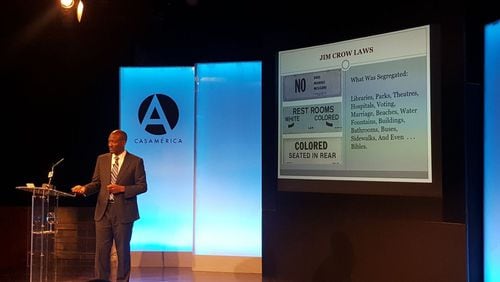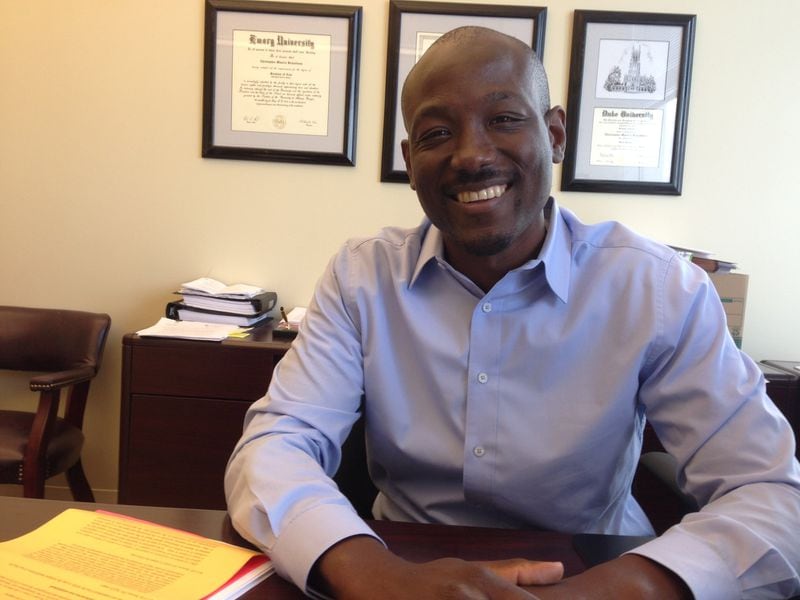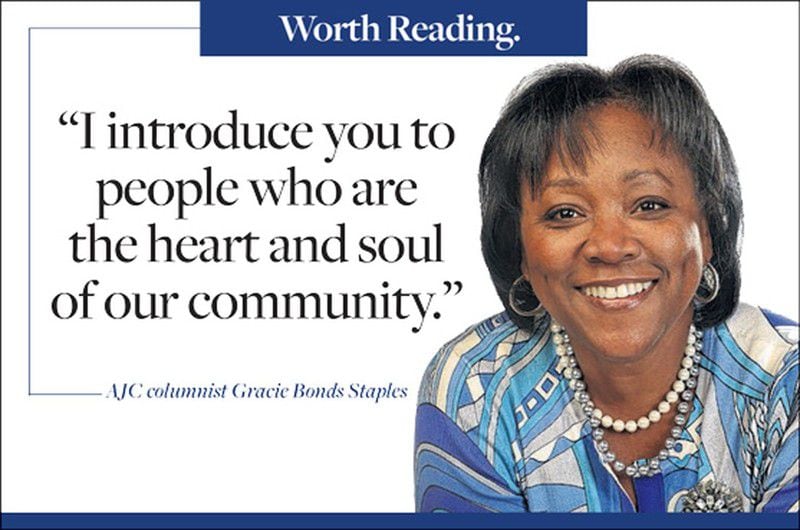After five years of practicing law at two of the country’s premier firms, Chris Richardson had finally landed his dream job as a U.S. diplomat.
Not only was he able to travel the world, he could serve his country, assisting American citizens abroad in danger and interviewing visa applicants seeking to visit or reside in the United States. He managed a staff of 25 people and lived in a big house in downtown Madrid, Spain, a marked difference from the hardscrabble life he knew growing up in South Carolina.
“Life was perfect,” he said.
Then in the winter of 2017, President Donald Trump issued an executive order barring citizens from seven Muslim-majority countries from entering the United States.
Richardson, 37, was so troubled by the travel ban he wrote a sworn declaration to the U.S. District Court for the Eastern District of New York saying that the waiver process was a sham.
“If someone from Yemen came to the embassy and said they wanted a visa, we couldn’t grant it,” he said. “There are a lot of checks and restrictions on officers that the government was not admitting to.”
It was just like Richardson to find a way to make it work. He saw it as his duty but the ban required him and other officers to deny visas to people from Muslim-majority countries even when they believed they should be granted. That, in his mind, wasn’t right.
“As a State Department employee, I felt we should’ve pushed back more on that decision,” he said. “I really felt that it was not in line with American values.”
RELATED: Clarkston refugees fear fallout from court ruling on travel ban
Meanwhile, Richardson’s declaration was somehow leaked to, and published by Slate magazine. Reuters soon got a hold of it and leaked it as well. Then Neal Katyal, the lead attorney opposing the ban, got it and showed it to the Supreme Court.
Justice Stephen Breyer, in his dissent in the travel ban case, quoted from Richardson’s sworn affidavit, which asserted that he and other officials did not, in fact, have discretion to grant waivers:
"According to this affidavit, consular officers 'were not allowed to exercise that discretion' and 'the waiver (process) is merely "window dressing."' See Declaration of Christopher Richardson, Alharbi v. Miller.
That didn’t sit well with Richardson’s bosses in the State Department, and they took him to task for airing the department’s “dirty laundry.” Some of his colleagues stopped talking to him.
Richardson’s only regret was that the affidavit didn’t help. The court upheld the ban by a 5-4 vote.
Then in January, the president expressed frustration with people coming to the U.S. from “shithole countries,” a reference to Haiti and African nations.
Rather than continue to support what he considered to be the discriminatory effects of the ban and in light of the president’s comments, Richardson resigned.
“I couldn’t do it anymore,” he said. “I felt I was no longer part of a solution but part of the problem, so I had to come home and try to help where I could.”
It wasn’t the first time Richardson had given up something big for something good.
RELATED: Overseas work makes nurse long for more merciful immigration policy
In 2003, when I first met him, he’d turned down a full one-year scholarship to the University of St. Andrews in Scotland even though he’d spent most of his life dreaming of traveling abroad one day.
Growing up, there was never enough money to take him beyond the discount books his mother could buy. A couple of times, he went on field trips with his school — once to Washington and once to Denver.
“I wanted that scholarship bad, and I’d gone through a pretty rigorous process to get it,” he told me at the time. “Then I just remembered who I am.”
Don’t miss that last sentence. Even as a teen, Richardson understood the importance of knowing who you are and standing for something.
Instead of studying in Scotland, he took a job as a pro bono assistant at Atlanta Legal Aid, helping cancer patients because he’d weathered that battle himself.
Even though doctors gave him five years to live, Richardson’s cancer went into remission. That was more than 20 years ago, but the cancer that took part of a lung and nearly all his right leg, in the end, gave his life meaning, an undeniable purpose.
Credit: The Atlanta Journal-Constitution
Credit: The Atlanta Journal-Constitution
In 2004, Richardson left Legal Aid and went to law school at Duke University. After graduating in 2008, he worked for two years at Kilpatrick Stockton in Raleigh, N.C., and then transferred to Alston and Bird here in Atlanta, where he spent three years before taking the foreign services exam and joining the State Department.
It was another opportunity to live out the dream he’d had as a little boy.
After seven years with the State Department, though, Richardson made the hard decision to leave to become an immigration attorney, helping reunite families; ICE detainees, and U.S. companies trying to gain entry for potential employees.
He’s currently representing unaccompanied minors and undocumented immigrants arrested at a Tennessee meat-packing company.
“It’s a challenging environment but very rewarding knowing that I’m at least trying to contribute,” he said.
This is a really important time in American history. Except for our shared disdain for Congress, we seem to be divided over everything.
What’s even more troubling is we seem to believe compromise means getting more of what we want, not what’s best for the whole.
Chris Richardson seems to know better.
“You can compromise on most things, but you shouldn’t compromise on your principles, even if it means giving up something big,” he said.
You can hear a lot more about that Monday at North Decatur Presbyterian Church. Richardson will be there to talk about immigration law, diplomacy and what it took to walk away from his dream job.
Find Gracie on Facebook (www.facebook.com/graciestaplesajc/) and Twitter (@GStaples_AJC) or email her at gstaples@ajc.com.
EVENT PREVIEW
A Conversation with Chris Richardson
7 p.m. Sept. 24. North Decatur Presbyterian Church, 611 Medlock Road, Decatur. 404-636-1429.
About the Author









